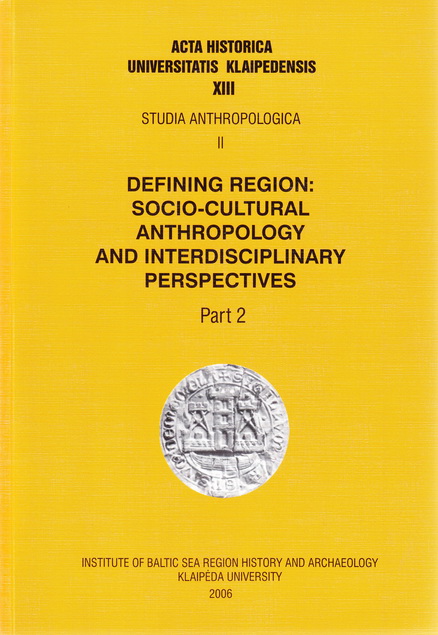Volume 13 (2006): Studia Anthropologica, II: Defining Region: Socio-cultural Anthropology and Interdisciplinary Perspectives, Part 2, December 2006

Order by:
Pub. online: 20 Dec 2006
Type: Introduction
 Open Access
Open Access
Journal:
Acta Historica Universitatis Klaipedensis
Volume 13 (2006): Studia Anthropologica, II: Defining Region: Socio-cultural Anthropology and Interdisciplinary Perspectives, Part 2, pp. 5–8
Pub. online: 20 Dec 2006
Type: Article
 Open Access
Open Access
Journal:
Acta Historica Universitatis Klaipedensis
Volume 13 (2006): Studia Anthropologica, II: Defining Region: Socio-cultural Anthropology and Interdisciplinary Perspectives, Part 2, pp. 9–18
Abstract
Pub. online: 20 Dec 2006
Type: Article
 Open Access
Open Access
Journal:
Acta Historica Universitatis Klaipedensis
Volume 13 (2006): Studia Anthropologica, II: Defining Region: Socio-cultural Anthropology and Interdisciplinary Perspectives, Part 2, pp. 19–30
Abstract
Pub. online: 20 Dec 2006
Type: Article
 Open Access
Open Access
Journal:
Acta Historica Universitatis Klaipedensis
Volume 13 (2006): Studia Anthropologica, II: Defining Region: Socio-cultural Anthropology and Interdisciplinary Perspectives, Part 2, pp. 31–46
Abstract
Pub. online: 20 Dec 2006
Type: Article
 Open Access
Open Access
Journal:
Acta Historica Universitatis Klaipedensis
Volume 13 (2006): Studia Anthropologica, II: Defining Region: Socio-cultural Anthropology and Interdisciplinary Perspectives, Part 2, pp. 47–55
Abstract
Pub. online: 20 Dec 2006
Type: Article
 Open Access
Open Access
Journal:
Acta Historica Universitatis Klaipedensis
Volume 13 (2006): Studia Anthropologica, II: Defining Region: Socio-cultural Anthropology and Interdisciplinary Perspectives, Part 2, pp. 57–69
Abstract
Pub. online: 20 Dec 2006
Type: Article
 Open Access
Open Access
Journal:
Acta Historica Universitatis Klaipedensis
Volume 13 (2006): Studia Anthropologica, II: Defining Region: Socio-cultural Anthropology and Interdisciplinary Perspectives, Part 2, pp. 71–80
Abstract
Pub. online: 20 Dec 2006
Type: Article
 Open Access
Open Access
Journal:
Acta Historica Universitatis Klaipedensis
Volume 13 (2006): Studia Anthropologica, II: Defining Region: Socio-cultural Anthropology and Interdisciplinary Perspectives, Part 2, pp. 81–88
Abstract
Pub. online: 20 Dec 2006
Type: Article
 Open Access
Open Access
Journal:
Acta Historica Universitatis Klaipedensis
Volume 13 (2006): Studia Anthropologica, II: Defining Region: Socio-cultural Anthropology and Interdisciplinary Perspectives, Part 2, pp. 89–102
Abstract
Pub. online: 20 Dec 2006
Type: Article
 Open Access
Open Access
Journal:
Acta Historica Universitatis Klaipedensis
Volume 13 (2006): Studia Anthropologica, II: Defining Region: Socio-cultural Anthropology and Interdisciplinary Perspectives, Part 2, pp. 103–116
Abstract